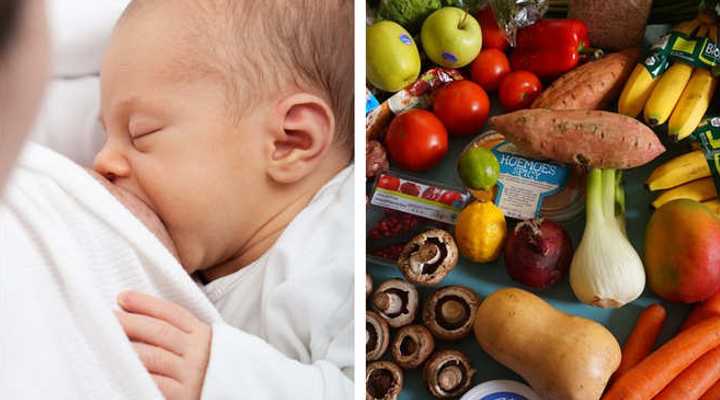Nutritious diet for Breastfeeding Mothers

Sixty-four per cent of the children, under 6 months, in India are exclusively breastfed; they rely on mother’s milk as their only source of food, nutrients, and vitamins to survive and thrive. This apart, 96% of children under 2 yrs are breastfed in our country. Therefore, it is vital to support, protect and promote a nutritious diet of a breastfeeding mother that will ensure a healthy start to her infant’s life.
A lactating mother’s macro- as well as micro-nutrient requirements to accommodate the needs of her baby shoots up both from before pregnancy as well as from when she was pregnant. The Indian Council of Medical Research (2020) guidelines suggest a daily additional intake of 600Kcal and 520 Kcal as well as 13.6g and 10.6g protein for lactating mothers with 0-6 months and 7-12 months of baby respectively. Requirements of calcium (1000mg/day), vitamin A (720ug/day), iodine (200ug/day) and other micronutrients also goes up significantly as the mother breastfeeds.
To meet these growing requirements through a healthy nutritious diet, breastfeeding mothers must remember the following key points:
• Hydrate: Drink plenty of boiled and cooled water to make up for the loss.
• Sugars should not replace the extra calories required: To ensure a nutritious diet, breastfeeding mothers should cut down on all forms of sugar and choose healthier ingredients that match the additional intake. While we do recognise sweets, chocolates, aerated drinks in this category easily; brown sugar, jaggery, honey, high fructose corn syrup are all also different forms of sugar which often goes unrecognised.
• Choose your Oils wisely: Omega 3 fatty acids are required to help strengthen the development of a baby’s brain and mothers’ own needs. Fish, flaxseeds, chia seeds, walnuts are great sources of omega 3 fatty acids which breastfeeding mothers can include in their daily diets. Replacing omega 6 fatty acid rich seed oils with ghee, olive oil, mustard oil can help optimise the omega 6:3 ratio.
• Select healthy Carbohydrates: Replacing rice with foxtail millets, including sorghum, ragi, bajra in your wheat flour, and overall increasing your portion size of pulses and nuts by reducing cereals will help balance your diet with the goodness of health. Eliminating intake of processed simple carbohydrates such as bread, noodles, biscuits, and allied snacks will go a long way in maintaining your health.
• Eat a variety of Vegetables: To meet additional micronutrient requirements, antioxidants and improve immunity, green-leafy vegetables such as spinach, fenugreek leaves, amaranth; as well as vegetables like capsicum, cauliflower, beetroot, pumpkin, cabbage should be considered. Additionally, lemon helps improve iron absorption.
Include garlic, carom seeds, fennel seeds, drumstick leaves, garden cress seeds in everyday recipes. They aid in digestion, absorption, as well as secretion of milk. These can be mixed as a paste or powdered and included in chutneys, cheelas, paranthas, and daily curry preparations.
• From Pulses to Seeds: Using sprouted pulses, beans, and seeds as much as possible will increase nutrient bioavailability and support in digestion. This could include sprouted pulse cheela, sprouted seeds chutney, sprouted beans curry etc.
• Increase Protein Intake: Milk, cream, egg, cheese, cottage cheese, yogurt, fish, meat, and chicken are excellent sources of protein and provide a variety of micronutrients that are difficult to obtain in adequate quantities from plant-sourced foods alone. Breastfeeding mothers must ensure these foods are stored safely and hygienically and are well-cooked before consumption. A variety of seeds such flaxseeds, fennel, chia, fenugreek, sunflower, pumpkin seeds, drumstick leaves’ powder used in various forms are also great sources of protein, fats, and micronutrients. Including these in various recipes, curries, as pastes or pancakes are great ways to improve the diet quality.
• Diversify your Diet: While a mother must strive to include foods from as many food groups as possible, she must include ‘a minimum’ or ‘at least’ five food groups daily out of the following ten. Grains; Pulses; Nuts and Seeds; Dairy products; Meat, Poultry and Fish; Eggs; Dark Green Leafy Vegetables; Vitamin A-Rich fruits and vegetables; as well as other fruits and vegetables.
• Salt and Sun: It is equally important for the mother to have 15-20 minutes of sun exposure preferably between 11 a.m. to 3 p.m. Moreover, to maintain and support their thyroid gland, breastfeeding mothers must consume iodised salt.
• Do not forget your supplements: Lastly, breastfeeding mothers must keep up with their calcium and iron supplements, as prescribed by the practitioner.







